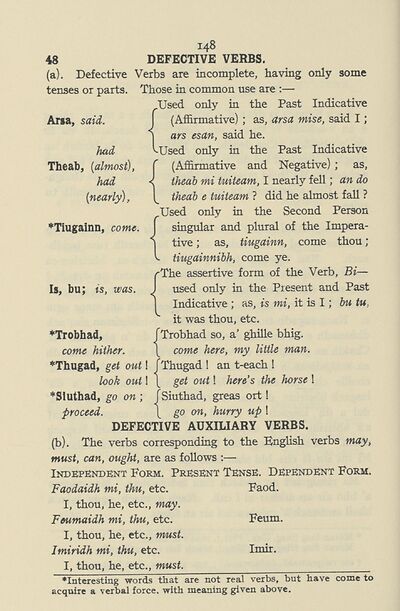Download files
Complete book:
Individual page:
Thumbnail gallery: Grid view | List view

48
(a). Defective
tenses or parts.
Aria, said.
had
Theab, [almost),
had
[nearly),
♦Tiugainn, come
Is, bu; is, was.
♦Trobhad,
come hither.
"Thugad, get out
look out
*SIuthad, go on ;
proceed.
148
DEFECTIVE VERBS.
Verbs are incomplete, having only some
Those in common use are :—
Used only in the Past Indicative
{(Affirmative) ; as, arsa mise, said I;
ars esan, said he.
Used only in the Past Indicative
f (Affirmative and Negative) ; as,
< theab mi tuiteam, I nearly fell; an do
theab e tuiteam ? did he almost fall ?
Used only in the Second Person
singular and plural of the Impera-
] tive; as, tiugainn, come thou ;
v- tiugainnibh, come ye.
I”-The assertive form of the Verb, Bi—
J used only in the Present and Past
Indicative ; as, is mi, it is I ; bu tu
it was thou, etc.
fTrobhad so, a’ ghille bhig.
\ come here, my little man.
! f Thugad ! an t-each !
! \ get out! here’s the horse !
JSiuthad, greas ort!
\ go on, hurry up !
DEFECTIVE AUXILIARY VERBS.
(b). The verbs corresponding to the English verbs may,
must, can, ought, are as follows :—
Independent Form. Present Tense. Dependent Form.
Faodaidh mi, thu, etc. Faod.
I, thou, he, etc., may.
F&umaidh mi, thu, etc. Feum.
I, thou, he, etc., must.
Imiridh mi, thu, etc. Imir.
I, thou, he, etc., must.
•Interesting words that are not real verbs, but have come to
acquire a verbal force, with meaning given above.
(a). Defective
tenses or parts.
Aria, said.
had
Theab, [almost),
had
[nearly),
♦Tiugainn, come
Is, bu; is, was.
♦Trobhad,
come hither.
"Thugad, get out
look out
*SIuthad, go on ;
proceed.
148
DEFECTIVE VERBS.
Verbs are incomplete, having only some
Those in common use are :—
Used only in the Past Indicative
{(Affirmative) ; as, arsa mise, said I;
ars esan, said he.
Used only in the Past Indicative
f (Affirmative and Negative) ; as,
< theab mi tuiteam, I nearly fell; an do
theab e tuiteam ? did he almost fall ?
Used only in the Second Person
singular and plural of the Impera-
] tive; as, tiugainn, come thou ;
v- tiugainnibh, come ye.
I”-The assertive form of the Verb, Bi—
J used only in the Present and Past
Indicative ; as, is mi, it is I ; bu tu
it was thou, etc.
fTrobhad so, a’ ghille bhig.
\ come here, my little man.
! f Thugad ! an t-each !
! \ get out! here’s the horse !
JSiuthad, greas ort!
\ go on, hurry up !
DEFECTIVE AUXILIARY VERBS.
(b). The verbs corresponding to the English verbs may,
must, can, ought, are as follows :—
Independent Form. Present Tense. Dependent Form.
Faodaidh mi, thu, etc. Faod.
I, thou, he, etc., may.
F&umaidh mi, thu, etc. Feum.
I, thou, he, etc., must.
Imiridh mi, thu, etc. Imir.
I, thou, he, etc., must.
•Interesting words that are not real verbs, but have come to
acquire a verbal force, with meaning given above.
Set display mode to:
![]() Universal Viewer |
Universal Viewer | ![]() Mirador |
Large image | Transcription
Mirador |
Large image | Transcription
| An Comunn Gàidhealach > An Comunn Gàidhealach Publications > Elementary course of Gaelic > (160) |
|---|
| Permanent URL | https://digital.nls.uk/196028880 |
|---|
| Description | This contains items published by An Comunn, which are not specifically Mòd-related. It includes journals, annual reports and corporate documents, policy statements, educational resources and published plays and literature. It is arranged alphabetically by title. |
|---|
| Description | A collection of over 400 items published by An Comunn Gàidhealach, the organisation which promotes Gaelic language and culture and organises the Royal National Mòd. Dating from 1891 up to the present day, the collection includes journals and newspapers, annual reports, educational materials, national Mòd programmes, published Mòd literature and music. |
|---|---|
| Additional NLS resources: |
|

